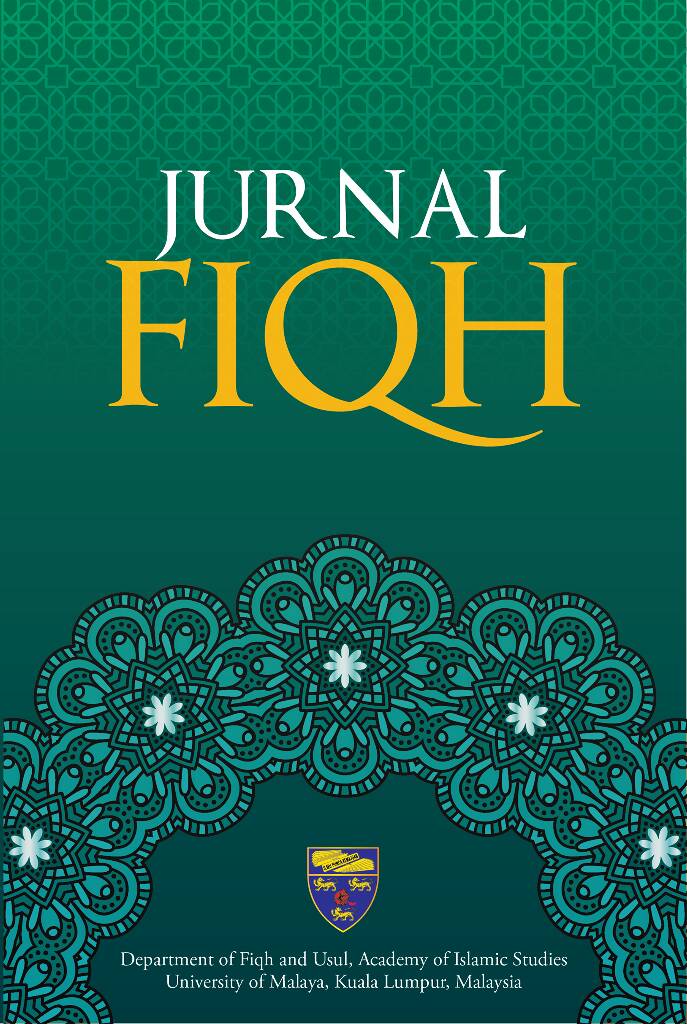NUPTIAL AGREEMENT IN MUSLIM MARRIAGE: A JURISTIC ANALYSIS
DOI:
https://doi.org/10.22452/fiqh.vol21no1.1Keywords:
Pre-nuptial, Post-nuptial, Khulʼ, Marriage, Shartu fāsid, Islamic jurisprudenceAbstract
The nuptial agreement is been gaining attraction in the Muslim environment in recent times because of the assumed benefit to protect either of the marital partners in the advent of divorce or separation. Prenuptial clauses usually take effect immediately after marriage consummation and every party can lay claim to the agreement in the event of a breach of agreement while postnuptial agreements are clauses agreed upon during the marriage period. Although there are complaints that Muslims from Western and non-Islamic societies might need prenuptial agreement in the place of khulʼ (redemption) to protect either party in the case of future divorces or separation, however, there are concerns about the rate of interest in the new couples from Muslim society opting for a prenuptial agreement.
This study explores the concepts of prenuptial and postnuptial and their associated use by Muslim couples in contemporary reality. The study will examine why Muslim couples from Islamic society are opting for nuptial agreement rather than khulʼ regulations in Islamic law and the need to identify essential thresholds in juristic conditioning for nuptial agreements in a Muslim marriage, especially in the case of Shartu fāsid (invalid conditions) in a marriage agreement. The study uses a doctrinal approach to gathering and analysis of data from an Islamic perspective. The study proposed useful suggestions from the finding on juristic conditioning in the application of prenuptial and postnuptial agreements in Muslim society.
Downloads
References
Abu Abdullah Ahmad bin Muhammad bin Hanbali bin Hilal bin Asad As-Shaibani. Musnad Al-Imam Ahmad bin Hanbal (S.Al-Arnuhuth, Ed.). Muasasat Ar-Risalah. (2001).
Andreevna, A. B., Anatol’evna, S. B., Nikolaevna, A. S.Chudeyevich, A. I., & Victorovna, D. N. Prenuptial Agreement: Concept and Characteristics (2020), 3571-3577.
At-Tirmidhī, M. bin I. bin surah bin M. Sunan At-Tirmidhī (Al-Jāmiʽu Al-Kabīr) (Bashar Iwad Maruf, Ed.). Dar Al-Garb Al-Islami. (1996).
Collins, K. E. Constructive Nonviolation in Patent Law and the Problem of Insufficient Thought Control’ (2007) 2007(4)
Wisconsin Law Review 759 MLA 9th ed. Collins, Kevin Emerson. In Wisconsin Law Review 759, no. 4 (2007).
Ghosh, A., & Kar, P. PRE-NUPTIAL AGREEMENTS IN INDIA:AN ANALYSIS OF LAW AND SOCIETY. (2019). http://aaml. org/about-the academy/press/press-releases/prenuptial-agreements-rise-finds-survey
Glazier, S. D., Shenkman, M. M., & Gassman, A. Spring a015 DAPTs and Klabacka: At the Intersection of Estate Planning
and Family Law (2021).
Gust, S. A., & Jordan, C. The Community Impact Statement: A Prenuptial Agreement for Community-Campus Partnerships. In Journal of Higher Education Outreach and Engagement 11, no. 2 (2006).
Harun, N., Bidin, A., Salleh, K., & Hamid, N. ‘Ashikin. Minor’s Capacity to Contract in Malaysia: Issues and Challenges. International Journal of Academic Research in Business and Social Sciences, 8(12) 1549–1556. (2019).
Ibn Quddāmah, A. bin M. bin Q. A.-J. A.-M. Al-Mughnī (At-Turki wa Al-Halu, Ed.). Dar alali Al-kutub. (1997).
Judiasih, S. D. Postnuptial Agreement: A Comparison of Legal Systems In Indonesia And Other Countries. Journal of Legal, Ethical and Regulatory 24, no. 5 (2021).
Julia Kagan, What Is a Postnuptial Agreement? How It Works and What’s Included, available at: https://www.investopedia. com/terms/p/postnuptial_agreement.asp, (2021).
Lawal Mohammed Bani & Hamza A. Pate, Dissolution of Marriage (Divorce) under Islamic Law, Journal of Law, Policy and Globalization, vol. 42, 2224-3259. (2015).
Lowe, N. (2007). InDret. Marija Ignjatovic. PRENUPTIAL AGREEMENT. Series: Law and Politics 5, no. 1 (2007), 61-69. Mehmood, M. I., & Farooq, S. Khul’(Redemption) in Islamic lawand its practice in Pakistani courts, a legal critical analysis. Mediterranean Journal of Social Sciences 5. no. 3 (2014a). 290–297.
Muḥammad bin Ismāʻīl Al-Bukhārī, A. A. Saḥiḥu Al-Bukharī. Dār ibn Al-Kathīr. (2002).
Muhammad Fuad Sawari. Al-Madkhal Ila Dirasat Usul al-Fiqh al-Islami (3rd ed.). Research Management Centre, IIUM (2009).
Muhammad Said Al-Mujahid, Fiqh al-Usrah (Juristic Study of Family Institution, International Islamic University
Malaysia. (2016) 76-80.
Rajamanickam, R., Kung, K. B., Shariff, A. A. M., Said, M. H. M., & Dahlan, N. K. Prenuptial agreement: Legal position in Malaysia. Academic Journal of Interdisciplinary Studies, 8(4), (2019a). 97-106.
Sharon Thompson, Prenuptial Agreement and the Presumption of Free Choice: Issues of Power in Theory and Practice,
Oregon, Oxford: Hart Publishing, 2015), 64-58.
Subekti, S. Article ID: IJCIET_11_01_025 Doctorate Program of Law, University of 17 Agustus 1945 Semarang, Indonesia Liliana Tedjosaputro Faculty of Law, Indonesia International Journal of Civil Engineering and Technology, 11(1), (2020). 233–241. http://www.iaeme.com/ijciet/ issues.asp?JType=IJCIET&VType=11&IType=1http:// www.iaeme.com/IJCIET/issues.asp JType=IJCIET&VTyp e=11&IType=1
Werdinningsih, D. R. M. K. & A. H. Marriage Agreement During Marriage (A Postnuptial Agreement) Principle of Publicity as a Legal Protection for Creditors. Journal of Law, Policyand Globalization. (2020).













